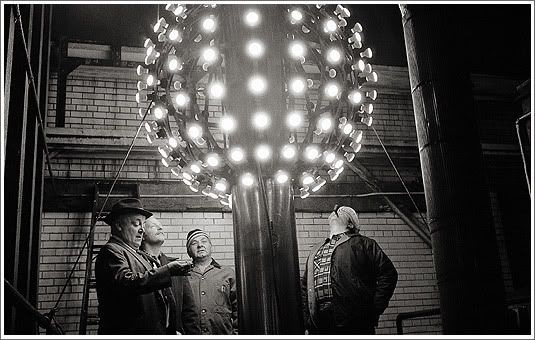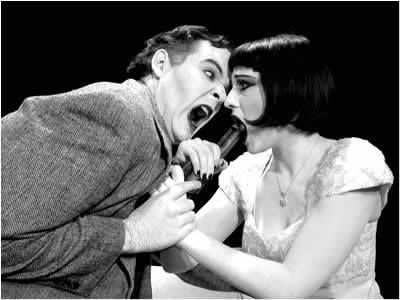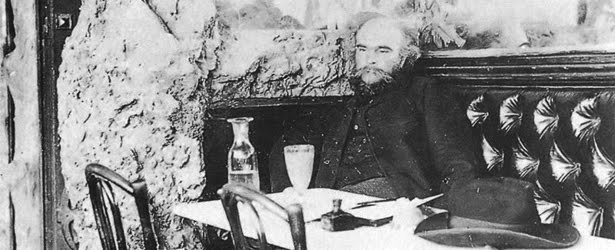 Sparkadia unravel those knots brought on by sticky, gooey love. On New Year's Eve you play their "Space & Time," because the song's protagonist talks about how his love traipsed all over Europe, even through those tiny microstates nobody gives a shit about, and yet she returned home to dance with him once again. (Maybe one of those impromptu, fervent, we-didn't-even-push-the-furniture-out-of-the-way jaunts, where the twirls and touches are just part of one long, choreographed dance the two have been performing since he first laid a hand on her waist many years back.) It's a nice image to clutch as you fish for confetti in your plastic cup of beer, and fight indigestion brought on by vegetable egg rolls and the Jonas Brothers performing in the cold with fingerless gloves.
Sparkadia unravel those knots brought on by sticky, gooey love. On New Year's Eve you play their "Space & Time," because the song's protagonist talks about how his love traipsed all over Europe, even through those tiny microstates nobody gives a shit about, and yet she returned home to dance with him once again. (Maybe one of those impromptu, fervent, we-didn't-even-push-the-furniture-out-of-the-way jaunts, where the twirls and touches are just part of one long, choreographed dance the two have been performing since he first laid a hand on her waist many years back.) It's a nice image to clutch as you fish for confetti in your plastic cup of beer, and fight indigestion brought on by vegetable egg rolls and the Jonas Brothers performing in the cold with fingerless gloves.
Monday, December 29, 2008
 Sparkadia unravel those knots brought on by sticky, gooey love. On New Year's Eve you play their "Space & Time," because the song's protagonist talks about how his love traipsed all over Europe, even through those tiny microstates nobody gives a shit about, and yet she returned home to dance with him once again. (Maybe one of those impromptu, fervent, we-didn't-even-push-the-furniture-out-of-the-way jaunts, where the twirls and touches are just part of one long, choreographed dance the two have been performing since he first laid a hand on her waist many years back.) It's a nice image to clutch as you fish for confetti in your plastic cup of beer, and fight indigestion brought on by vegetable egg rolls and the Jonas Brothers performing in the cold with fingerless gloves.
Sparkadia unravel those knots brought on by sticky, gooey love. On New Year's Eve you play their "Space & Time," because the song's protagonist talks about how his love traipsed all over Europe, even through those tiny microstates nobody gives a shit about, and yet she returned home to dance with him once again. (Maybe one of those impromptu, fervent, we-didn't-even-push-the-furniture-out-of-the-way jaunts, where the twirls and touches are just part of one long, choreographed dance the two have been performing since he first laid a hand on her waist many years back.) It's a nice image to clutch as you fish for confetti in your plastic cup of beer, and fight indigestion brought on by vegetable egg rolls and the Jonas Brothers performing in the cold with fingerless gloves.
 So there's a trivial but tingly moment in David (DM) Stith's "Hoarse Sorrows and the Whole Blind Earth" (from his EP, Curtain Speech) where the piano sounds lifted from a silent film. As the notes rise and fall, providing vital emotional cues, you can imagine the sepia-toned imagery and frantic, sped-up gesticulations of a pretty damsel being lowered into a lake full of fire-breathing bears. "The heroine is in peril!" Then the piano suddenly picks up in intensity. "Now she is being saved. The hero has arrived on horseback. Huzzah!"
So there's a trivial but tingly moment in David (DM) Stith's "Hoarse Sorrows and the Whole Blind Earth" (from his EP, Curtain Speech) where the piano sounds lifted from a silent film. As the notes rise and fall, providing vital emotional cues, you can imagine the sepia-toned imagery and frantic, sped-up gesticulations of a pretty damsel being lowered into a lake full of fire-breathing bears. "The heroine is in peril!" Then the piano suddenly picks up in intensity. "Now she is being saved. The hero has arrived on horseback. Huzzah!"But here's the thing: Stith would likely be more comfortable working within the silent film medium. On tracks like "Around the Lion Legs," his mouth sounds dry as he sings, like he's trembly nervous over expressing himself in such a manner. On "Just Once" he whispers the following couplet: "Just once, just once, just once / I could love you once." For Stith, words are an obstruction, a hurdle that must inevitably be cleared during the creative grind.
Lo-fi noodling, psych-folk trappings, bi-polar pop -- it's my hero at the moment.
Monday, December 8, 2008
 I suppose I'm akin to Jason Pierce when it comes to spiritual music, in that I'm drawn to a particular artist's ability to strengthen resolve, invoke peace, uplift, polish the soul, etc., rather than their inevitable message about our relationships with God. This is partly why I'm enjoying the Welcome Wagon so thoroughly. "He Never Said a Mumblin' Word" sounds like a lost folk ditty Alan Lomax would have catalogued. It's a narrative about the crucifixion ("They nailed him to a tree / And he never said a mumblin' word"), but it's the core themes of courage, steadfastness, and self-sacrifice I'm truly digging on.
I suppose I'm akin to Jason Pierce when it comes to spiritual music, in that I'm drawn to a particular artist's ability to strengthen resolve, invoke peace, uplift, polish the soul, etc., rather than their inevitable message about our relationships with God. This is partly why I'm enjoying the Welcome Wagon so thoroughly. "He Never Said a Mumblin' Word" sounds like a lost folk ditty Alan Lomax would have catalogued. It's a narrative about the crucifixion ("They nailed him to a tree / And he never said a mumblin' word"), but it's the core themes of courage, steadfastness, and self-sacrifice I'm truly digging on. On a side note, I recently read that there are over 800 references to music and its use in the Bible -- roughly a quarter of which detail Jesus' days as a teenage roadie for the Lemon Pipers.
Subscribe to:
Posts (Atom)
